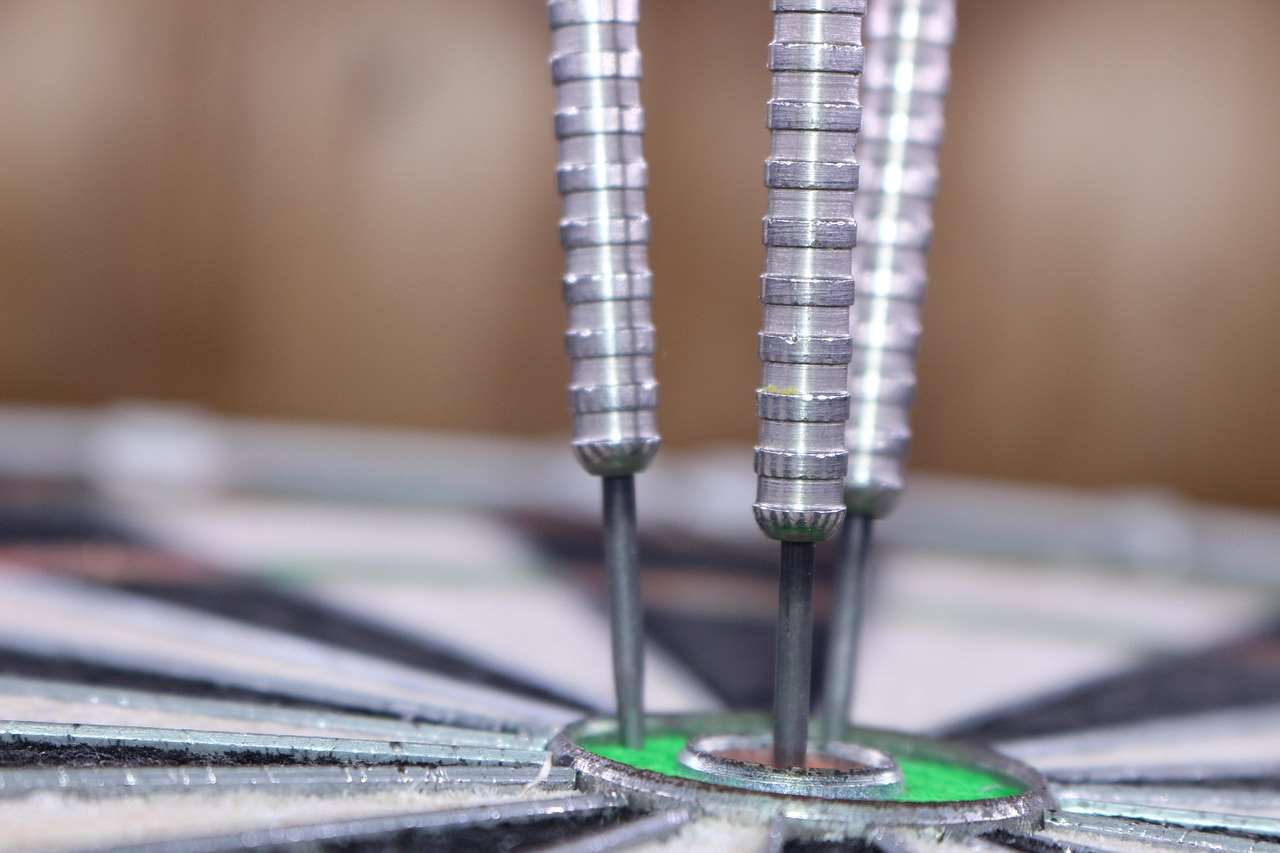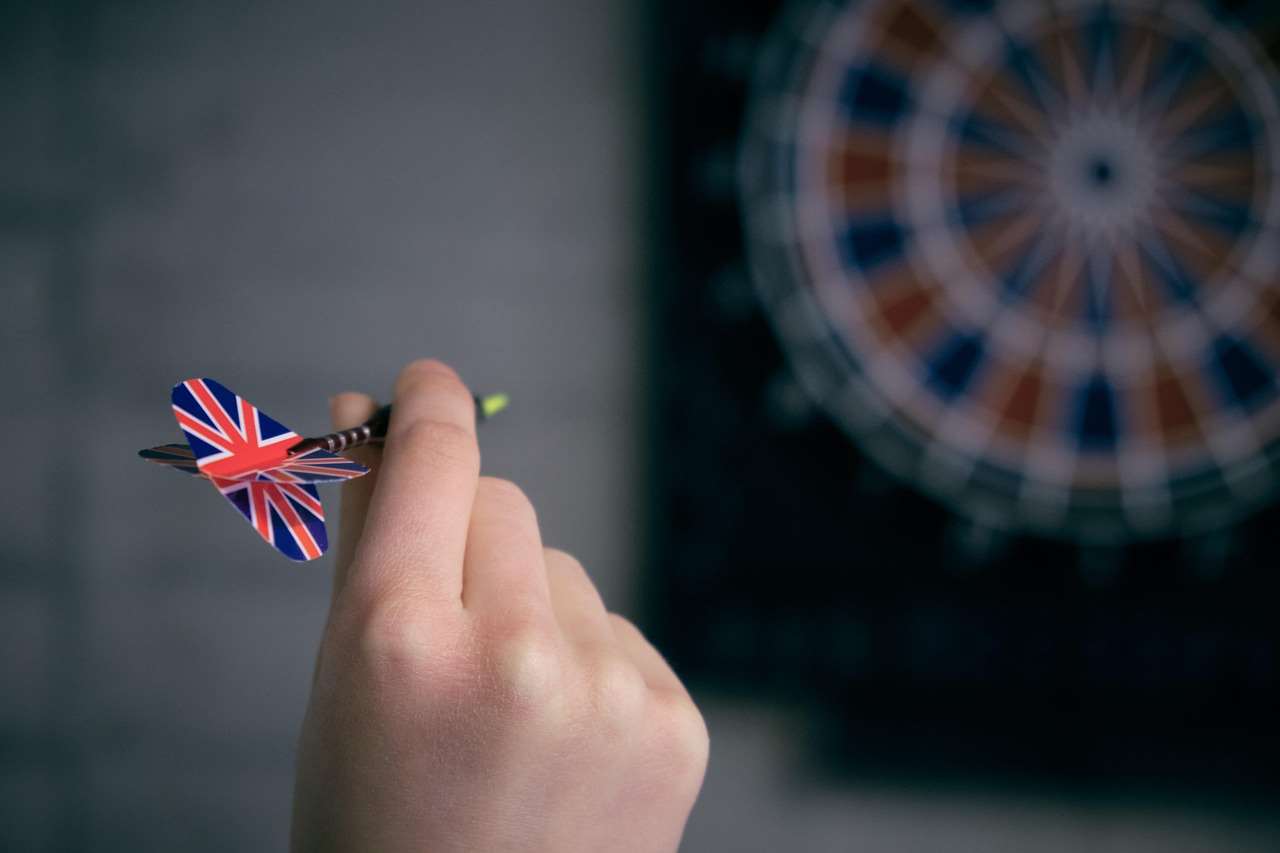Understanding Tungsten Grades For Darts is crucial for selecting the right equipment that enhances your performance and overall dart-playing experience. This article breaks down everything you need to know about tungsten grades, their impact on dart characteristics, and how to choose the best dart for your throwing style; we’ll also cover related topics like dart maintenance and the pros and cons of different tungsten percentages.
⚠️ Still Using Pen & Paper (or a Chalkboard)?! ⚠️
Step into the future! The Dart Counter App handles all the scoring, suggests checkouts, and tracks your stats automatically. It's easier than you think!
Try the Smart Dart Counter App FREE!Ready for an upgrade? Click above!
Why Tungsten Matters: An Introduction to Dart Materials
Before diving into the nuances of tungsten grades, it’s important to understand why tungsten is such a popular material for dart barrels. Traditionally, darts were made from brass, which is a relatively inexpensive and easily machinable metal. However, brass darts are bulky and less dense, leading to wider groupings on the dartboard. Tungsten, on the other hand, is significantly denser than brass. You can also read up on Brass vs Tungsten Darts Comparison for a deeper analysis.

This higher density allows manufacturers to create slimmer dart barrels with the same weight as their brass counterparts. A slimmer barrel translates to tighter groupings, as there is less obstruction for subsequent darts thrown. Think of it this way: if your first dart lands in the triple 20, a slimmer barrel makes it easier for your second and third darts to find their way into the same scoring zone. Therefore, the type of Best Material For Darts Barrels will significantly influence your game.
Decoding Tungsten Percentages: The Key to Understanding Tungsten Grades For Darts
The grade of tungsten in a dart is expressed as a percentage. This percentage represents the amount of tungsten present in the alloy used to create the dart barrel. The remainder of the alloy typically consists of nickel, iron, or copper, which are added to improve machinability and reduce the overall cost. For example, a 90% tungsten dart barrel contains 90% tungsten and 10% of other metals.
What Does the Tungsten Percentage Tell You?
A higher tungsten percentage indicates a denser and slimmer barrel, which, as we’ve established, is generally preferred by serious dart players. However, it’s crucial to understand that the percentage isn’t the only factor determining a dart’s performance. The design, weight, and grip also play significant roles. Here’s a breakdown:
- Density: Higher tungsten percentages equate to higher density, allowing for slimmer barrels.
- Cost: Darts with higher tungsten percentages are generally more expensive due to the higher cost of tungsten and the more complex manufacturing processes involved.
- Durability: While tungsten itself is durable, the overall durability of the dart also depends on the quality of the other metals in the alloy and the manufacturing process.
Beginners might consider exploring a Beginner Dart Barrel Materials Guide to grasp the fundamental materials used.
Common Tungsten Percentages and Their Implications
Let’s examine some common tungsten percentages you’ll find in dart barrels and their typical characteristics:
- 70-80% Tungsten: These darts are often more affordable and suitable for casual players or those just starting out. They offer a decent balance of performance and cost.
- 80-90% Tungsten: This is a popular range for intermediate to advanced players. These darts provide a good balance of slimness, durability, and cost.
- 90-97% Tungsten: These are high-end darts favored by professional players and serious enthusiasts. They offer the slimmest profiles possible, allowing for extremely tight groupings. Why Choose High Tungsten Darts? Because they offer superior control.
- 97% + Tungsten: These are less common and very expensive. Typically, these offer the absolute smallest barrel possible.

Ultimately, the best tungsten percentage for you depends on your personal preferences, skill level, and budget. Remember to consider Choose Best Dart Equipment that suits you best.
Beyond the Percentage: Factors Affecting Dart Performance
While the tungsten percentage is a significant indicator of dart quality and performance, several other factors contribute to the overall playing experience. It’s essential to consider these elements when making your dart selection:
Dart Weight
Dart weight is a crucial factor influencing your throwing style and accuracy. Darts typically range from 16 to 30 grams. Lighter darts are generally easier to throw with a smooth, controlled motion, while heavier darts tend to be more stable in the air and less susceptible to wind resistance. The optimal weight depends on your throwing technique and personal preferences. Experiment with different weights to find what feels most comfortable and accurate for you.
Dart Grip
The grip on your dart barrel is essential for consistent release and control. Dart barrels come in a variety of grip styles, ranging from smooth to heavily knurled. A more aggressive grip provides a more secure hold, which can be beneficial for players who struggle with slippage. However, a grip that is too aggressive can cause discomfort or even blisters. Experiment with different grip styles to find one that provides a comfortable and secure hold without causing any irritation.
Dart Shape and Balance
The shape and balance of the dart barrel also affect its flight characteristics. Common dart shapes include:
- Straight Barrel: Provides a consistent grip and even weight distribution.
- Torpedo Barrel: Has a thicker front section and a slimmer rear section, which can aid in grouping.
- Bomb Barrel: Similar to the torpedo barrel but with a more pronounced bulge in the front.
The balance point of the dart can also affect its trajectory. Front-weighted darts tend to fly straighter, while rear-weighted darts can be more forgiving of slight release errors.

Tungsten Alloys and Manufacturing Processes
The specific alloy used in a tungsten dart barrel and the manufacturing process also influence its quality and performance. Different alloys have varying levels of hardness, machinability, and corrosion resistance. High-quality tungsten darts are typically manufactured using precision machining techniques to ensure consistent weight and dimensions. Some manufacturers also use specialized coatings to enhance grip and protect the barrel from wear and tear.
The Impact of Alloy Composition
As mentioned earlier, the alloy used in tungsten darts typically includes nickel, iron, or copper. The specific proportions of these metals can affect the dart’s properties. Nickel, for example, improves corrosion resistance, while iron can increase hardness. The manufacturer’s choice of alloy composition can significantly impact the dart’s overall performance and durability.
Manufacturing Precision
The manufacturing process plays a crucial role in ensuring consistent weight and dimensions across a set of darts. Precision machining techniques, such as CNC turning, are used to create dart barrels with tight tolerances. This ensures that each dart in the set flies similarly, which is essential for consistent scoring.
Caring for Your Tungsten Darts
Proper care and maintenance can extend the lifespan of your tungsten darts and maintain their performance. Here are some tips:
- Regular Cleaning: Wipe your dart barrels regularly with a soft cloth to remove dirt, oil, and debris.
- Point Maintenance: Keep your dart points sharp to ensure they stick in the dartboard properly. Use a dart sharpener to maintain the points’ sharpness.
- Storage: Store your darts in a dart case or holder to protect them from damage when not in use.
- Avoid Dropping: Dropping your darts on hard surfaces can damage the barrels or points.
Choosing the Right Tungsten Dart For You: A Practical Guide
Selecting the right tungsten dart involves considering your skill level, throwing style, and personal preferences. Here’s a practical guide to help you make the best choice:
- Determine Your Budget: Tungsten darts range in price from around $30 to over $200 per set. Set a budget before you start shopping to narrow down your options.
- Consider Your Skill Level: Beginners may benefit from more affordable 70-80% tungsten darts, while experienced players may prefer higher-percentage darts.
- Experiment with Different Weights: Try out different dart weights to find what feels most comfortable and accurate for you.
- Choose a Grip That Suits You: Select a grip style that provides a secure hold without causing discomfort.
- Read Reviews: Read online reviews to get insights from other dart players about the performance and durability of different dart models.

Advanced Considerations: Match Weighting and Custom Darts
For serious dart players, match weighting and custom darts are important considerations. Match weighting ensures that each dart in a set weighs exactly the same, which is crucial for consistent performance. Custom darts are designed to meet your specific needs and preferences, allowing for personalized weight, grip, and balance.
Match Weighting Explained
Match-weighted dart sets are typically more expensive because they require additional quality control during the manufacturing process. The manufacturer carefully weighs each dart and selects sets where the weight difference between the darts is minimal (typically within 0.1 grams). Match weighting ensures that each dart flies identically, which can improve your accuracy and consistency.
The Benefits of Custom Darts
Custom darts offer a personalized experience that can be difficult to achieve with off-the-shelf models. You can work with a dart manufacturer to design a dart that meets your exact specifications, including:
- Weight: Choose the precise weight that feels most comfortable and accurate for you.
- Grip: Select the grip style, depth, and placement that provides the optimal hold.
- Shape: Customize the barrel shape to suit your throwing style.
- Balance: Adjust the balance point to achieve the desired flight characteristics.
While custom darts can be expensive, they can be a worthwhile investment for serious players looking to optimize their performance.
Common Misconceptions About Tungsten Darts
There are several common misconceptions surrounding tungsten darts. Let’s debunk a few of them:
- Higher Tungsten Percentage Always Equals Better Performance: While higher tungsten percentages generally result in slimmer barrels, other factors like weight, grip, and throwing style play crucial roles. There’s no one-size-fits-all solution.
- Tungsten Darts Are Indestructible: While tungsten is a durable metal, dart barrels can still be damaged by dropping them on hard surfaces or subjecting them to excessive wear and tear.
- All Tungsten Darts Are the Same: Different manufacturers use different alloys and manufacturing processes, which can significantly affect the quality and performance of tungsten darts.
Always ensure you Choose Right Dart Material Guide and read up on the specifics to make an informed decision.

Final Thoughts on Understanding Tungsten Grades For Darts
Understanding Tungsten Grades For Darts involves more than just looking at the percentage. It’s about considering the interplay of various factors such as weight, grip, shape, and manufacturing processes, all tailored to your individual throwing style and preferences. By carefully evaluating these aspects, you can choose the perfect set of tungsten darts that elevates your game to the next level. Remember to prioritize comfort, control, and consistency in your selection process. Explore the world of tungsten darts and experiment to discover what works best for you!
Ready to upgrade your dart game? Visit your local dart shop or browse online retailers to explore the wide range of tungsten darts available and find the perfect set for you! Consider reading more about Tungsten Darts Pros Cons Explained to further improve your knowledge.
Hi, I’m Dieter, and I created Dartcounter (Dartcounterapp.com). My motivation wasn’t being a darts expert – quite the opposite! When I first started playing, I loved the game but found keeping accurate scores and tracking stats difficult and distracting.
I figured I couldn’t be the only one struggling with this. So, I decided to build a solution: an easy-to-use application that everyone, no matter their experience level, could use to manage scoring effortlessly.
My goal for Dartcounter was simple: let the app handle the numbers – the scoring, the averages, the stats, even checkout suggestions – so players could focus purely on their throw and enjoying the game. It began as a way to solve my own beginner’s problem, and I’m thrilled it has grown into a helpful tool for the wider darts community.